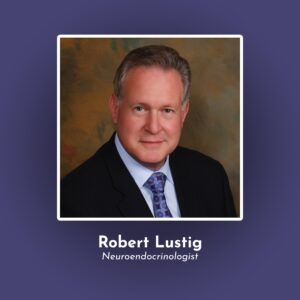
Show Summary
In this episode, Dr. Robert Lustig joins Nate to dive into the metabolism of the micro level of human systems – the humans ourselves. Over the last century, accompanying the transformation of our energy systems, our food and consumption patterns have been massively transformed. One of the biggest areas of change is the dramatic increase in sugar consumption. But are our bodies adapted to eating such high sugar, processed foods? What are the health effects connected to this way of eating? And, writ large, how does our metabolic dysfunction as individuals contribute to the energy hungry global Superorganism? What are the systemic drivers that currently prevent a shift towards healthier food systems? Can changing how we eat make us healthier – and thus better equipped to face the complex challenges of the metacrisis?
About Robert Lustig
Robert H. Lustig, M.D., M.S.L. is Emeritus Professor of Pediatrics in the Division of Endocrinology, and Member of the Institute for Health Policy Studies at UCSF. Dr. Lustig is a neuroendocrinologist, with expertise in metabolism, obesity, and nutrition. He is one of the leaders of the current “anti-sugar” movement that is changing the food industry. He has dedicated his retirement from clinical medicine to help to fix the food supply any way he can, to reduce human suffering and to salvage the environment. Dr. Lustig graduated from MIT in 1976, and received his M.D. from Cornell University Medical College in 1980. He also received his Masters of Studies in Law (MSL) degree at University of California, Hastings College of the Law in 2013. He is the author of the popular books Fat Chance (2012), The Hacking of the American Mind (2017), and Metabolical: The Lure and the Lies of Processed Food, Nutrition, and Modern Medicine (2021).
In French, we have a motto that says that a simple drawing is often better than a long explanation. Jean-Marc Jancovici Carbone 4 President
That’s very understandable because with left atmosphere thinking, one of the problems is that you see everything as a series of problems that must have solutions. Iain McGilchrist Neuroscientist and Philosopher
We can’t have hundreds and hundreds of real relationships that are healthy because that requires time and effort and full attention and awareness of being in real relationship and conversation with the other human. Nate Hagens Director of ISEOF
This is the crux of the whole problem. Individual parts of nature are more valuable than the biocomplexity of nature. Thomas Crowther Founder Restor
Show Notes & Links to Learn More
Download transcript00:10 – Robert Lustig Works + Info + Metabolical: The Lure and the Lies of Processed Food, Nutrition, and Modern Medicine
03:03 – Chronic Disease
03:17 – Chronic diseases accounts for 75% of healthcare costs and none of them have a cure
04:34 – Mitochondria
05:32 – Food and climate
07:09 – Fructose
07:49 – Organism fat storage strategies to survive famine
08:50 – We are consuming 25x the amount of sugar than our ancestors did 200 years ago
09:49 – Declining lifespan in America
10:35 – Glucose
10:42 – AMP-Kinase
11:06 – HADH
11:46 – Original Gatorade – Dr. Robert Cade
13:48 – [20%] of our GDP is the healthcare system
14:12 – Carbon Pulse
16:18 – Trans-fats
17:15 – Bacteria can’t digest trans-fats
17:08 – Mitochondria are ‘repurposed’ bacteria
18:57 – Fred Kummerow 1957 paper on dangers of trans-fats
19:38 – FDA banned trans-fats
19:47 – Olive oil (oleic acid) heated past its smoking point will become a trans-fat
21:13 – PFAS
21:15 – Teflon
21:32 – Obesogens
21:45 – Martin Scheringer + TGS Episode
23:05 – Average American body temperature is 1.5℉ lower than 150 years ago
24:12 – Whole30
24:20 – Larabars
25:02 – Dr. Carlos Monteiro (Sao Paulo University)
25:12 – NOVA system of categorizing processing of foods
26:12 – 63% of the food consumed in the U.S. is in the ultra-processed category
26:30 – Percentages of food consumed in the ultra-processed category in other countries
27:57 – Dr. Monica Dus (U. Michigan) and tongue desensitization to sugar
28:48 – Supernormal stimuli
29:07 – Anything that stimulates the dopamine reward system in the extreme is addictive
30:50 – Eric Clapton and Ed Bradley Clip
31:35 – Fructose and alcohol are metabolized in the mitochondria in the same way
31:51 – Type 2 diabetes & fatty liver disease were the diseases of alcoholics, and now children get them
32:12 – NIEHS
35:29 – Relative Value Units
38:26 – Mitochondria are recycled – Autophagy
39:10 – Ubiquitin
40:50 – Ways to increase autophagy
41:15 – Spermidine
41:47 – Intermittent fasting
43:12 – ICD-9 and ICD-11 codes
44:44 – Blue Cross
45:08 – Casino model of insurance
45:31 – Obamacare 15% cap on insurance company profit
47:27 – Epidemic of obese newborns
48:13 – Anthony Cashmore, The Lucretian Swerve
50:38 – The first food subsidy was in 1790 as a sugar tariff
51:49 – 1933 Farm Bill
52:07 – The Dust Bowl
54:20 – [Updated 1995-2021] US subsidies to food and agriculture
57:50 – Nitrous oxide, carbon dioxide, and methane as greenhouse gasses
1:00:09 – CAFO’s
1:00:30 – Antibiotic resistance and industrial animal agriculture
1:02:56 – Antibiotics, vaccination, and hygiene as primary drivers of increase in lifespan
1:04:11 – Superbugs
1:05:12 – Importance of microbial diversity in the gut
1:06:45 – Fiber is a prebiotic for the bacteria in your gut
1:08:25 – IFIC
1:12:02 – 93% of Americans have some metabolic dysfunction (Tufts)
1:13:25 – Increased warmth is increasing plant growth but reducing micronutrients
1:13:53 – Soil vs dirt
1:15:15 – We have artificially selected for foods high in sugar and low in micronutrients
1:17:34 – Food deserts and the cost of real food is 4x higher than processed food
1:21:15 – The power of educating children (generational change)
1:21:45 – Rainbow Chefs Academy
1:25:06 – Elissa Epel – The Stress Prescription, The Telomere Effect
1:25:30 – Amygdala






